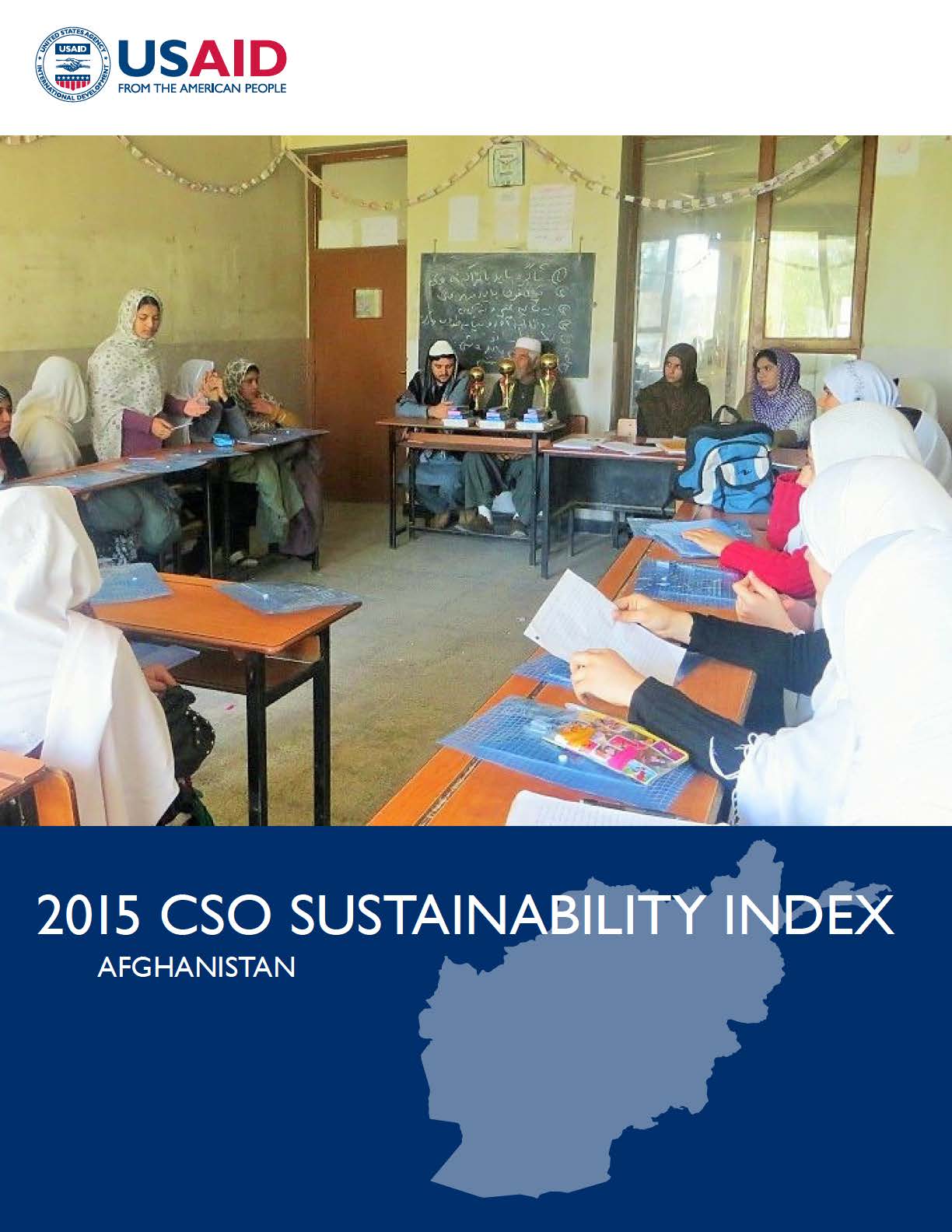- What We Do
- Agriculture and Food Security
- Democracy, Human Rights and Governance
- Democracy, Human Rights and Governance Strategy
- Supporting Free and Fair Elections
- Supporting Vibrant Civil Society & Independent Media
- Protecting Human Rights
- Promoting Accountability & Transparency
- Importance of Democracy, Human Rights, & Governance to Development
- Countering Trafficking in Persons
- Economic Growth and Trade
- Education
- Ending Extreme Poverty
- Environment and Global Climate Change
- Gender Equality and Women's Empowerment
- Global Health
- Water and Sanitation
- Working in Crises and Conflict
- U.S. Global Development Lab
BACKGROUND & APPROACH
The 2015 CSO Sustainability Index (CSOSI) for Afghanistan looks at the sustainability of the civil society sector based on an assessment by local civil society representatives and experts. The CSOSI is an important tool for civil society organizations (CSOs), governments, donors, and academics for understanding and measuring the sustainability of the CSO sector. This publication complements other editions of the CSOSI which together now cover 71 countries and territories in Central and Eastern Europe and Eurasia, Sub-Saharan Africa, the Middle East and North Africa, and Asia. The Index scores seven interrelated dimensions of CSO sustainability: Legal Environment, Organizational Capacity, Financial Viability, Advocacy, Service Provision, Infrastructure, and Public Image. These scores are averaged to produce an overall score for CSO sustainability. Details of the methodology can be found at http://www.usaid.gov/afghanistan/civil-society-sustainability/.
FINDINGS
Civil society plays a vital role in local and national development in Afghanistan. As of August 2015, 5,789 associations (including social organizations, foundations, and unions) were registered with the Ministry of Justice (MOJ), and 2,060 NGOs were registered with the Ministry of Economy (MOE), slight increases since 2014. There are also numerous informal and unregistered CSOs, including village-based Shuras (community-based councils), Jirgas (tribal assemblies of elders), and youth movements advocating for change in their communities.
While CSOs still operate in a difficult environment marked by insecurity, CSO sustainability has improved over the five years that the CSO Sustainability Index for Afghanistan has been carried out. Advocacy has improved markedly over the past five years, aided by improvements in CSO coordination and collaboration with the government since the establishment of the National Unity Government (NUG) in late 2014.
Throughout 2015, a vibrant civil society was committed to advocating for the rights of citizens. For example, CSOs and activists marched on the streets of Kabul and several provinces to urge the government to take action to put a stop to ethnic violence and violence against women. During the year, CSOs also promoted various laws and amendments impacting the CSO sector, including the Access to Information Law, the Law on Associations, the Law on Non-Governmental Organizations (NGOs), and tax incentives for donations.
CSOs still struggle with limited organizational capacities and decreasing international funding. They have made progress in this area, however, as donors have started forming more long-term partnerships with CSOs in the provinces and providing resources for institutional development, which has increasingly prompted CSOs to engage in strategic planning. At the same time, increased competition for funding has driven CSOs to improve their organizational capacities, including strengthening internal management systems and constituency building efforts. In 2015, partnerships between CSOs and other sectors, as well as community contributions, started to cover CSOs’ basic costs.
Scores for Infrastructure and Public Image have also improved somewhat over the past five years: CSOs have formed new networks and thematic groups, while CSOs’ involvement in the 2014 elections, particularly their civic education initiatives and mobilization of voters, increased public appreciation of the role of CSOs as well as media coverage. Other dimensions of sustainability—Legal Environment, Financial Viability, and Service Provision—have remained largely the same.








Comment
Make a general inquiry or suggest an improvement.